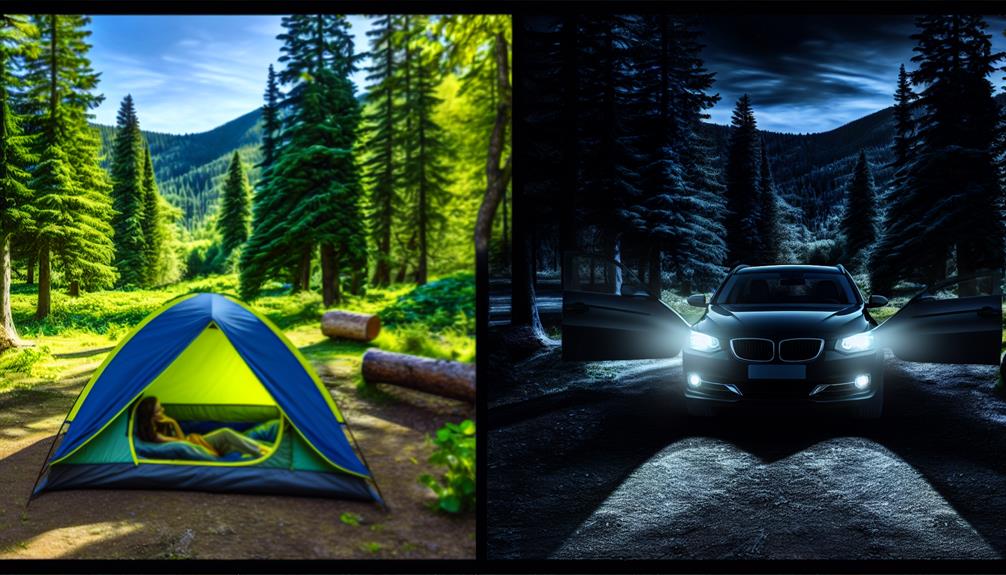Considering the safety aspects of sleeping outdoors, the debate between choosing a tent or a car as your shelter for the night raises valid concerns.
While both options have their advantages and drawbacks, determining which is ultimately safer involves a thorough evaluation of various factors. Factors like location, weather conditions, and personal security preferences significantly impact this decision.
By examining the pros and cons of each choice, a clearer understanding of the safety implications can be gained.
So, which option provides a more secure rest under the stars?
Key Takeaways
- Sleeping in a car provides better security measures such as alarms and locked doors.
- Tent camping offers a traditional outdoor experience with challenges like uneven ground.
- Cars offer comfort and controlled sleeping environments for campers seeking convenience.
- Tents promote self-reliance and resilience in outdoor challenges but may lack security against intruders.
Pros and Cons of Sleeping in a Tent
When considering the pros and cons of sleeping in a tent, it is essential to weigh factors such as comfort, mobility, and exposure to the elements. Sleeping conditions in a tent can provide a unique outdoor experience, allowing you to be immersed in nature and providing a sense of adventure. The closeness to nature can enhance relaxation and provide a break from the hustle and bustle of daily life. However, sleeping in a tent may present challenges such as uneven ground, temperature fluctuations, and noise disturbances from wildlife or other campers.
Outdoor experiences while sleeping in a tent can be unparalleled, offering a genuine connection to the environment and a chance to disconnect from technology and distractions. The sounds of nature and the fresh air can contribute to a more restful sleep and a deeper appreciation for the outdoors. Additionally, sleeping in a tent promotes a sense of self-reliance and resilience as you adapt to different sleeping conditions and learn to navigate outdoor challenges.
Safety Considerations in a Tent
Considering the importance of ensuring a secure and protected sleeping environment while camping in a tent, it is crucial to address various safety considerations that are integral to a positive outdoor experience. When it comes to safety in a tent, campers should pay attention to the following:
- Shelter options
- Choose a suitable tent size according to the number of occupants to ensure comfort and safety.
- Inspect the tent for any tears, holes, or broken zippers before setting it up.
- Select a campsite that is free from potential hazards like falling branches or uneven ground.
These shelter options are essential for creating a safe and secure environment while camping in a tent.
In addition to shelter considerations, prioritizing camping safety measures such as securing food away from the tent to prevent wildlife encounters and having a first aid kit readily available can further enhance the camping experience. By being mindful of these safety aspects, campers can enjoy a worry-free outdoor adventure in their tent.
Benefits of Sleeping in a Car
Sleeping in a car provides campers with a versatile and secure alternative to traditional tent camping, offering unique benefits for outdoor enthusiasts seeking comfort and convenience on their adventures.
One significant advantage is the comfort level that a car can provide compared to a tent. The cushioned seats and ability to recline or adjust positions can make a significant difference in getting a good night's sleep.
Moreover, cars offer better temperature control, especially in extreme weather conditions. You can easily turn on the heater during cold nights or use the air conditioning on hot summer days to maintain a comfortable sleeping environment.
This ability to regulate temperature ensures that campers can have a more restful night compared to dealing with the temperature fluctuations that can occur in a tent. Overall, sleeping in a car can enhance the camping experience by offering a more comfortable and controlled sleeping environment for outdoor enthusiasts.
Security Measures in a Car
Security protocols in a car are crucial for ensuring the safety and protection of both the occupants and their belongings while camping or traveling. Implementing effective security measures can provide peace of mind and a sense of security in various situations. Here are some practical steps to enhance security in your car:
- Install a Car Alarm: A car alarm is a highly effective deterrent against theft or break-ins. Modern car alarms come with advanced features like motion sensors and remote access, offering an extra layer of security.
- Use Window Locks: Window locks are essential for preventing unauthorized access to the vehicle. By securing the windows, you can reduce the risk of intruders gaining entry and protect your belongings inside the car.
- Park in Well-Lit Areas: When parking your car, choose well-lit areas that are visible to the public. Bright lighting can deter potential thieves and provide a safer environment for you and your vehicle.
Comparison of Tent Vs. Car Safety
In evaluating the safety aspects of sleeping accommodations during outdoor activities, such as camping, a critical comparison can be drawn between the protection offered by a tent and that provided by a car.
When considering shelter options for outdoor sleeping, both tents and cars have their advantages and drawbacks. Tents offer a more traditional camping experience, providing a sense of closeness to nature. However, they may offer less protection against external elements and wildlife. On the other hand, cars provide a more secure and insulated environment, shielding occupants from adverse weather conditions and potential dangers. In terms of safety, sleeping in a car can offer more protection against intruders due to the locked doors and windows.
While tents can be easily set up in various terrains, cars provide a level of mobility that can be crucial in emergency situations. It is essential to consider the specific circumstances of the outdoor activity when deciding between a tent and a car for sleeping.
Ultimately, the choice between a tent and a car for sleeping during outdoor activities depends on factors such as personal comfort, safety concerns, and the surrounding environment.
Frequently Asked Questions
Can Animals Pose a Safety Risk When Sleeping in a Tent or Car?
Wildlife encounters can pose a safety risk when sleeping in a tent or car. Animals may approach seeking food or shelter, potentially causing harm. Noise levels from wildlife can also disrupt sleep quality, impacting rest and overall camping experience.
How Do Weather Conditions Affect Safety When Choosing Between Sleeping in a Tent or Car?
Weather conditions significantly impact safety and comfort when choosing between sleeping in a tent or a car. In remote areas, proper safety precautions are crucial. Ensure adequate gear for extreme conditions to stay safe and comfortable.
Are There Any Specific Health Concerns to Consider When Sleeping in a Tent Versus a Car?
When sleeping in a tent versus a car, specific health concerns to consider include air quality and temperature regulation. Tents may have poorer ventilation, leading to potential issues with air quality, while cars provide better insulation for maintaining a comfortable temperature. Noise levels and privacy can also vary between the two options.
What Steps Can Be Taken to Ensure Personal Safety When Sleeping in Remote Areas in Either a Tent or a Car?
Ensuring personal safety when sleeping in remote areas, whether in a tent or a car, is paramount. Take precautions such as securing your surroundings, having emergency contacts, carrying self-defense tools, and being aware of your surroundings at all times.
How Does the Choice Between Sleeping in a Tent or Car Impact Overall Comfort and Quality of Sleep?
When choosing between sleeping in a tent or a car, factors like sleeping positions, comfort levels, noise levels, and privacy concerns must be considered. Each option offers unique benefits and drawbacks that can impact overall rest quality.
Conclusion
In conclusion, when considering the safety of sleeping in a tent versus a car, it is important to weigh the pros and cons of each option.
While sleeping in a tent provides a closer connection to nature, it may also leave individuals more vulnerable to external threats.
On the other hand, sleeping in a car offers greater security and protection from the elements.
Ultimately, the choice between a tent and a car for sleeping should be based on individual preferences and safety concerns.

